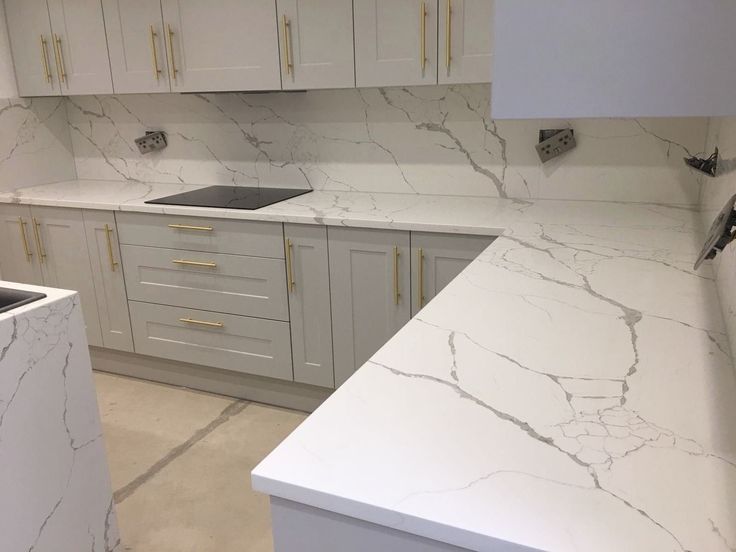When it comes to renovating your kitchen, one of the most important decisions is selecting the right material for the kitchen countertop. The variety of options available can be overwhelming, such as Nano White, Quartz, Tiles, Granite, or Marble. In this blog, we’ll discuss the pros and cons of each option to help you make the best decision for your kitchen slab.
Factors to Consider When Choosing a Kitchen Slab
Before diving into the materials, it’s crucial to think about a few key factors that will affect the performance of your kitchen countertop:
- Scratch Resistance:
Whether it’s turmeric stains, wine spills, or oil splatters, your countertop should be able to resist stains and damage. Quartz, for instance, is known for its scratch resistance. However, be cautious with very hot items, as placing extremely hot pots or pans can damage it. - Durability:
Durability is key in the kitchen where heavy items and constant use are common. Granite is one of the most durable options, with its strong composition ensuring that it won’t crack easily. On the other hand, Nano White, while non-porous, can lose its shine and color over time. - Maintenance and Cleaning:
A countertop should be easy to clean and maintain. Quartz is a non-porous material, which means it does not absorb liquids, making it easier to clean. However, it is important to use the right cleaning materials and avoid abrasive cleaners. Nano White can be easy to clean but requires more maintenance to avoid discoloration and wear. - Installation Process:
The installation of your countertop needs to be done with care. Different stones require different tools and expertise. For example, quartz needs skilled professionals and specialized equipment for installation. Ensure you ask your contractor about the process to avoid problems later. - Heat Resistance:
Not all stones can withstand high heat. For instance, while granite is heat-resistant, placing extremely hot items on a quartz surface can cause damage. Always use heat pads or trivets to protect your countertop.
Comparing Popular Kitchen Slab Materials
1. Quartz:
Quartz is highly scratch-resistant and non-porous, meaning it won’t absorb stains. It’s also easy to clean and has a uniform appearance. However, it can be sensitive to heat, and any direct contact with very hot items could cause damage. The installation process requires skilled labor, so make sure your contractor is experienced in handling quartz.
2. Granite:
Granite is a classic option for kitchen countertops. It’s incredibly durable and can withstand high temperatures. The natural stone is available in various colors and patterns, and it’s not prone to staining. However, like any natural stone, granite needs proper sealing to maintain its appearance. It’s also one of the more expensive options in the market.
3. Nano White:
Nano White is a modern, sleek option. It’s non-porous and resistant to stains, but over time, it may lose its shine. While it’s heat-resistant to some extent, long-term exposure to high temperatures can cause damage. It’s a cheaper alternative but might not be the best option for a kitchen where durability is critical.
4. Tiles:
Tiles are a versatile and cost-effective option for kitchen countertops. They come in a variety of designs and colors, making them a customizable choice. However, grout lines can collect dirt and be harder to clean. High-quality full-body tiles may reduce this issue, but they still don’t offer the seamless look of granite or quartz.
5. Marble:
Marble is elegant and timeless, offering a luxurious feel. However, it’s porous and susceptible to stains from acidic substances like lemon juice or vinegar. It also requires regular sealing to maintain its appearance. While it’s a beautiful material, it may not be the best option for a kitchen due to its maintenance needs.
Why I Chose Quartz for My Kitchen
After considering all the factors, I decided to go with Quartz for my kitchen. Despite its heat sensitivity, its durability and ease of maintenance make it the best option for me. I also love its modern look and feel, which suits my kitchen design. However, I’ll make sure to avoid placing extremely hot pans directly on the surface to preserve its condition.
Final Thoughts
Choosing the right stone for your kitchen countertop depends on your priorities—whether it’s durability, aesthetic appeal, ease of maintenance, or heat resistance. Granite is a reliable option if you want a long-lasting, low-maintenance stone, while quartz is perfect for those seeking a modern, stain-resistant surface. Nano White can work well in certain spaces but requires extra care, and tiles or marble could be ideal for those on a budget but willing to invest time in upkeep.
In the end, it’s essential to choose a stone that fits your lifestyle and design preferences. Don’t be swayed by the cheapest options without considering their long-term durability and performance.

